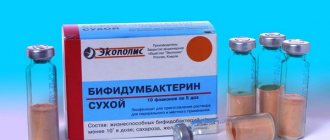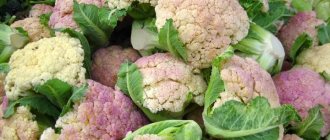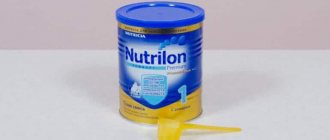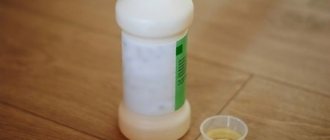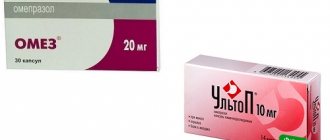How to help a child with intestinal colic
Problems with the “tummy” in a newborn baby are quite common. When colic occurs in the intestinal area, the child becomes restless. He begins to move his legs randomly, accompanying his actions with loud crying. Abdominal pain in a child occurs as a result of statistical contraction of the intestinal walls and increased gas formation. Intestinal colic usually goes away on its own by 3-4 months of a child’s life, and before this age it is necessary to help the newborn and infant avoid them with the help of special mixtures and the mother’s diet.
Causes of intestinal colic in newborns and infants
The main causes of colic in infants are the following factors:
- insufficient amounts of enzymes responsible for the digestion process, such as lactase and proteases. The first is responsible for the breakdown of lactose, the second component is for the digestion of proteins;
- failure of a nursing mother to follow a balanced diet;
— violation of the rules for preparing milk formula.
If there is a lack of lactase and protease enzymes, the proteins and lactose ingested in breast milk or formula are not fully broken down, which means that the remaining undigested substances enter the large intestine, where they are broken down by intestinal bacteria. And as a result, the following processes increase in the baby’s intestines:
The intensification of these processes, in turn, leads to abdominal pain, intestinal colic and stool disorders: diarrhea or constipation.
With age, lactase and protease enzymes begin to be produced in the required quantities and digestive problems disappear, so intestinal colic most often occurs in newborns and infants in the first months of life.
What diet should a mother have to prevent intestinal colic in her child?
To reduce the risk of pain in your baby after breastfeeding, you must follow the following rules:
1. Do not eat fatty foods (fatty fish, pig meat).
2. Do not eat spicy foods (seasonings and spices).
3. Do not overuse flour and sweet baked goods.
4. Do not overuse legumes.
5. Do not eat fried foods (food should be boiled, baked or steamed).
6. Do not eat smoked or dried foods (sausages, frankfurters, shanks, etc.)
7. Do not consume live fermented kvass or non-alcoholic beer.
If the child is on artificial or mixed feeding, then the following points must be taken into account:
— failure to comply with the dosage when preparing the mixture can also lead to colic in the baby, so the mixture must be diluted strictly according to the instructions;
- when feeding an “artificial baby”, it is necessary to keep the bottle with the mixture in the correct position, that is, so that the child does not swallow air along with the mixture. Air entering the stomach and intestines causes bloating and abdominal pain;
- the hole in the nipple from the bottle should be such that the milk mixture flows out of it in rare drops; a hole that is too small will allow air to be swallowed, and a hole that is too large will cause the baby to choke and suffocate.
Following these simple rules will help you avoid big problems.
Helpful tips during and after feeding
The following actions will help to significantly reduce the likelihood of colic and excessive regurgitation:
- before feeding the baby, you need to lay him on his tummy;
- at the end of feeding, raise the baby to an upright position for a few minutes (5-10). This action will help the baby burp air;
- if a child becomes restless after eating and begins to cry, then you should carefully stroke his tummy in a clockwise circular motion. You can also iron the diaper with a hot iron, apply it to the baby’s tummy and, taking him in your arms, hold him close to you and walk around with him in your arms;
- you can put a warm heating pad on the baby’s tummy, after wrapping it in a diaper;
- regularly, starting from two weeks of the baby’s life, give him special teas with fennel, which help reduce the processes of gas formation and the passage of gas. A child can be given 100 ml of tea per day;
- an excellent remedy for intestinal colic and bloating is Espumezan in the form of an emulsion; it can be given to infants 3-4 times a day, 1 teaspoon (40 mg).
If a child has problems with the digestive system, it is necessary to urgently consult a pediatrician. Only a specialist has the right to carry out this or that assignment. Most likely, if the child is on mixed or artificial feeding, a special mixture for intestinal colic may be needed.
Composition and effectiveness of mixtures for constipation
Colic affects babies under three to four months of age. They may appear during breastfeeding. Then the mother is obliged to reconsider her diet and the need to introduce complementary foods into the baby’s diet. The mixtures contain all the necessary elements for the development and normal functioning of the digestive system and the whole body. With the right choice of product, the baby’s well-being should return to normal.
It is difficult to choose mixtures for constipation and colic for newborns for the first time. It is necessary to consult with a pediatrician, study the composition and recommendations of the manufacturer.
What should be included:
- Probiotics – bifidobacteria and lactobacilli.
- Prebiotics are the best enemy of constipation.
- Carob bean gum.
Medicines for colic
Let's look at the most popular and affordable remedies for colic. They can be purchased at any pharmacy after a doctor's prescription.
Bobotik
Bobotik is a drug based on simethicone. Sixteen drops of the drug can eliminate unpleasant symptoms in the stomach and calm the baby. The drug is not absorbed in the stomach and is excreted unchanged in the feces. If the baby does not want to drink drops, Bobotik can be added to a feeding bottle, formula, or dropped onto the mother’s nipple. The medicine is perfect for most children - it does not cause allergies and does not contain sugar. One bottle of drops is enough for fifty times. The main substance is simethicone. It is a combination of stabilized polymers, which, due to their properties, destroy air bubbles in the stomach and prevent the formation of new ones. The chemically inert drug does not affect the enzymes of the gastrointestinal tract and prevents constipation. Being present in the stomach, the drug does not change the composition of gastric juice, its reaction, and does not affect the absorption of food. Recommendations for taking Bobotik:
- the drug is used after consultation with a pediatrician;
- Before use, the bottle must be shaken to obtain a homogeneous mixture;
- to accurately measure the number of drops, you must hold the bottle vertically;
- the drug is taken either immediately after meals or before bedtime;
- It is permissible to use the drug for newborns after each feeding.
Espumisan
The drug Espumisan is widely used in pediatric practice. The medicine is not absorbed into the intestines and only affects gas bubbles in the stomach. By removing air bubbles, the drug does not have a harmful effect on the digestive tract and is absolutely safe for the newborn’s body and does not cause constipation. Espumisan does not contain sugar or lactose, so it can be given to children with diabetes or lactose intolerance. For convenient use, the drug is produced in the form of an emulsion, measured either in drops or with a spoon. To achieve the desired effect, one scoop of the drug is enough to relieve colic. Espumisan in the baby's stomach destroys gas bubbles that interfere with the normal absorption of nutrients. Therefore, after gases are removed, food absorption is better.
We open the question: Types and beneficial properties of fish with which you can start feeding your child
Blends without iron
A diet low in this element or completely absent is an excellent method for preventing colic. Iron can have a toxic effect on a newborn, affecting the gastric mucosa. This leads to inflammation, digestive disorders, flatulence and, as a result, abdominal cramps. The Dutch mixture Frisolak, produced by the Friesland company, is ideal for newborns, since the taste of Frisolak closely resembles the taste of mother's milk. The mixture contains beta-carotene, essential fatty acids, and dietary fiber. Due to the low inclusion of iron, Frisolak is recommended for babies suffering from colic. The mixture is also highly effective against constipation. Another product of the Frisland company is Frisovo. Its composition is similar to Frisolak, already known to us, but differs in the content of carob gluten as a thickener. It stimulates the growth of bacteria necessary for the stomach and intestines, loosening food and stimulating peristalsis. Frisov is recommended for children suffering from constipation and flatulence.
We open up the question: How does a child’s stool change after the introduction of complementary foods?
